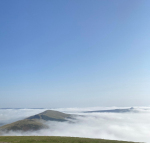
“Not all those who wander are lost.” In fact, they might just be about to create or discover something transformational, as the writer of those words, JRR Tolkien, did while wandering around Oxfordshire. Or as Newton did wandering in his orchard. Or Fleming while pondering on the lack of mould on his petri dish. Or Archimedes pondering about the water on his bathroom floor.
The combination of wandering and pondering, both physically and intellectually, has given us some of the greatest, most transformational ideas in history. So why don’t we do more of it?
Most of us don’t need to review the volumes of research to know that we rarely come up with good ideas when we’re working at a screen, racing against the clock, or trying to manage a dozen things at once. It’s only when we free our minds and give ourselves the time and space to fully immerse and explore that we come up with the real diamonds.
Yet even though we know this, few of us make the time, say a couple of hours a day, a couple of days a month, a couple of weeks a year, fully set aside just to explore, experiment, think; to follow our own curiosity.
And even fewer of us make the space to get out of our bubbles, workplaces, and “systems”, to look at the world and its challenges from a completely different perspective.
That’s probably because on paper it sounds like an indulgence. A bit of a skive or a holiday. Not the kind of thing a conscientious, serious leader would ever call work when there’s an organisation to run. But it’s not an indulgence – in fact it can be hard work and sometimes quite scary to take a genuinely disciplined and dedicated approach to wandering and pondering.
We might think of Archimedes as simply the guy who ran naked down the street shouting “Eureka” but proving that his displacement method could accurately measure the purity of metals took years of disciplined experimentation.
Or we might think of Newton as the guy who was struck by an apple, then immediately by the concept of gravity. But he was arguably the most dedicated (and perhaps unhinged) scientist of his age, famously inserting knitting needles between his eyeballs and his skull to develop his understanding of optics and the workings of the human eye.
A couple of years ago Hillary Cottam wrote about her own risky wanderings and ponderings in the book Radical Help, describing how she stepped outside of “the system” that surrounded a handful of seriously struggling families, and stepped into their space, building a team around her that aimed to discover solutions from the inside looking out, rather than from the outside looking in.
The discipline they took to their experimentation, and the dedication involved in sticking with their principles and commitments to the families, even in the most challenging of circumstances, has given us an incredibly valuable vantage point from which to rethink our ideas about communities, agency, social care, and even social change.
Exploring ideas can be hard and scary, and it reminds me of another famous Tolkien quote: “It’s a dangerous business, Frodo, going out your door. You step onto the road, and if you don’t keep your feet, there’s no knowing where you might be swept off to.”
Of course, we could just busy ourselves in our organisational Hobbit-holes and leave the wandering and pondering to those braver and wilder than we are. But equally, we know that over the months and years ahead, the challenges we face will only continue to grow, and many of us simply won’t have the capacity or income to address them using the models and mentalities we have today.
And we can be reasonably confident that the types of thinking and ideas that we will need are unlikely to come from inside our offices, organisations, or systems.
Far more likely they will come from those unchartered spaces, but only if we make the time and space to explore and experiment, and ponder about what we see, and demonstrate the discipline and dedication to wander the paths we discover, wherever they may sweep us off to.
So, how are you creating the time and space to create or discover your transformational potential?
